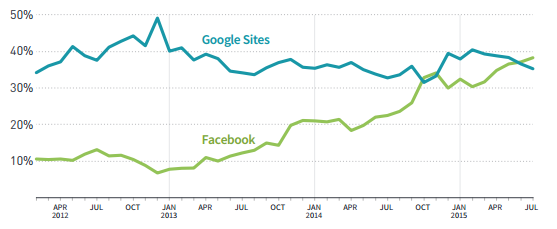Facebook Pulls Ahead of Google In Referral Traffic
Last quarter, Facebook surpassed Google in referral traffic to news sites, challenging the search giant's dominance and becoming its most formidable competitor in yet another area.
Last quarter, Facebook surpassed Google in referral traffic to news sites, challenging the search giant's dominance and becoming its most formidable competitor in yet another area.
Google may be synonymous with web traffic to many people, but Facebook refers more traffic to news sites, according to recent data from traffic analytics firm Parse.ly.
In its quarterly Authority Report, Parse.ly looked at referral traffic to the 100 top news sites, as ranked by comScore and Alexa. From May through July, 43 percent of the referral traffic came from social and 38 percent from search. Google sites – including Google.ca and Google News – and Facebook accounted for nearly three-quarters of that. By comparison, Yahoo and Twitter, numbers three and four, made up a combined total of 9.3 percent of the referral traffic.
Though Google traditionally made up the lion’s share of the referral traffic, the search giant peaked in the fall of 2013, when Facebook steadily started to increase. Other than a brief dip around October, Google has always been dominant, until last quarter. Facebook’s referral traffic share is stronger than it’s ever been, making up 38.3 percent, to Google’s 35.8 percent.

“Google is not a slouch of a referrer. It’s still very close to Facebook as a proprietor of traffic and as you can see, the next referrers are miles away from Facebook and Google as a pair, so it’s not like this is a huge tectonic shift for Facebook,” says Andrew Montalenti, co-founder and chief technology officer at Parse.ly. “Facebook overtaking Google may not be a huge surprise on its own, but I think I’m surprised to see the degree to which Google plateaued.”
Montalenti refers to a trend he’s seeing of news finding you, rather than you searching for news. With that in mind, he thinks publishers have been focused on social content more than SEO, and Facebook was there to capitalize on that and work with publishers, rather than just treat it like any other website.
In October, Google executive chairman Eric Schmidt said the company’s biggest competition is Amazon, not fellow search engines Yahoo and Bing. But recent research points out that the search giant’s most fierce competitor is actually Facebook.
Last month, cloud-based marketing solution IgnitionOne found that Facebook’s display growth is up 48 percent year-over-year, while Google’s is down 9 percent. Facebook is also a formidable opponent to YouTube; not even a year after making its algorithm more video-friendly, the social media powerhouse reached 4 billion daily video views.
“I think [Facebook] executed Google’s playbook in its own vertical-focused way, in social. We sort of saw, pre-[initial public offering], it was all about user growth and acquisition. Post IPO, it was about turning on the revenue engine and paid traffic,” Montalenti says. “For a long time, Google had a moat built around search and built up its position around its strength in search. Search is this very powerful thing, but I think its realizing that social is also a really powerful thing that has something search doesn’t.”